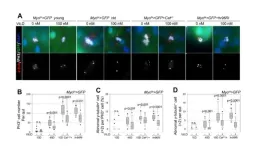(Press-News.org) MINNEAPOLIS/ST. PAUL (2/27/2024) — In a major scientific breakthrough, newly published research from an international consortium led by the University of Minnesota’s Masonic Cancer Center has the potential to transform the landscape of ovarian cancer treatment.
Published today in JAMA Network Open, the findings indicate that ovarian cancer patients with high levels of stroma within their tumors are twice as likely to exhibit chemoresistance to the conventional standard of care. Stroma is the non-cancerous tissue that provides support to tumors.
The team, led by Drs. Martina Bazzaro and Emil Lou, built on their previous report that shows a marker known as high tumor stroma proportion (TSP) — identified using routine biopsy and surgical samples from patients with ovarian cancer — is a powerful predictor of patient outcomes and chemoresistance in ovarian cancer. TSP is the proportion of non-cancer tissue in a tumor compared to the portion containing cancerous cells.
“What sets our research apart is its simplicity and potential clinical impact. While previous studies have linked the expression of stromal genes to poorer progression-free and overall survival rates in ovarian cancer, our study demonstrates that a straightforward assessment of tumor-stroma proportion can serve as a valuable biomarker for clinical outcomes,” said Martina Bazzaro, PhD, an associate professor at the U of M Medical School and Masonic Cancer Center researcher.
The study, which was performed in close collaboration with researchers from the University of Tubingen in Germany and the Karolinska Institute in Sweden, was conducted independently in two cohorts. One group included 103 cases from The Cancer Genome Atlas, while the other group had 192 cases from the University of Tubingen. All patients had surgery to remove their cancer and were given chemotherapy as part of their treatment.
The research team examined digital images of patient tissue samples and divided tumors into two categories based on the amount of stroma tissue they contained. Some tumors had less than 50% stromal tissue, while others had 50% or more stromal tissue. A statistical analysis led to the conclusion that tumors with high TSP were associated with patients with poorer outcomes and were more likely to develop resistance to chemotherapy.
“This research marks a significant step forward in the fight against ovarian cancer, and we are committed to translating these findings to the forefront of clinical practice for patients diagnosed with this cancer,” said Emil Lou, MD, PhD, an associate professor at the U of M Medical School, Masonic Cancer Center researcher and medical oncologist with M Health Fairview. “Our work paves the way for utilizing a readily obtainable, effective and relatively inexpensive biomarker to help tailor more effective treatments based on their individual tumor profiles.”
The researchers strongly advocate for the standardization of TSP measurement and its integration into prospective clinical trials as a predictive biomarker for drug resistance. To further validate the findings — both retrospectively and prospectively — the team aims to leverage the resources of national cooperative groups that administer clinical trials at multiple sites throughout the country to perform further ultimate validation of TSP as a biomarker that should be used in routine practice. They also plan to incorporate artificial intelligence into their approach and develop an algorithm based on TSP for more precise outcome predictions.
This work was supported by the U.S. Department of Defense, the Minnesota Ovarian Cancer Alliance, the American Cancer Society, the Randy Shaver Cancer Research and Community Fund, the Mu Sigma Chapter of the Phi Gamma Delta Fraternity at the University of Minnesota and the Litman Family Fund for Cancer Research.
###
About the University of Minnesota Medical School
The University of Minnesota Medical School is at the forefront of learning and discovery, transforming medical care and educating the next generation of physicians. Our graduates and faculty produce high-impact biomedical research and advance the practice of medicine. We acknowledge that the U of M Medical School is located on traditional, ancestral and contemporary lands of the Dakota and the Ojibwe, and scores of other Indigenous people, and we affirm our commitment to tribal communities and their sovereignty as we seek to improve and strengthen our relations with tribal nations. For more information about the U of M Medical School, please visit med.umn.edu.
About the Masonic Cancer Center, University of Minnesota
The Masonic Cancer Center, University of Minnesota, is the Twin Cities’ only Comprehensive Cancer Center, designated ‘Outstanding’ by the National Cancer Institute. As Minnesota’s Cancer Center, we have served the entire state for more than 30 years. Our researchers, educators, and care providers work to discover the causes, prevention, detection, and treatment of cancer and cancer-related diseases as well as provide whole-of-life care and resources for survivorship. Learn more at cancer.umn.edu.
END
U of M-led research identifies predictor of outcomes, chemoresistance for ovarian cancer patients
2024-02-27
ELSE PRESS RELEASES FROM THIS DATE:
NRG Oncology announces new leadership of Canadian Members Subcommittee
2024-02-27
NRG Oncology, a National Cancer Institute (NCI) National Clinical Trials Network (NCTN) group focused on improving outcomes for adults with cancer through multi-center clinical research, recently announced a new Chair and Vice Chair of the organization’s Canadian Members Subcommittee.
The NRG Canadian Members Subcommittee is tasked with engaging and supporting NRG’s Canadian member institutions through their participation in NRG research. This subcommittee was created to tackle the unique regulatory, administrative, and ...
Bariatric surgery provides long-term blood glucose control, type 2 diabetes remission
2024-02-27
BATON ROUGE – People with type 2 diabetes who underwent bariatric surgery achieved much better long-term blood glucose control compared to people who received medical management plus lifestyle interventions, according to a new study published in JAMA, or Journal of the American Medical Association, and funded by the National institute of Diabetes, Digestive and Kidney Diseases, part of The National Institutes of Health.
In addition, participants who underwent bariatric surgery, also called metabolic or weight-loss surgery, were more likely to stop needing diabetes medications and had higher rates of diabetes remission up to 12 years post-surgery. ...
The anti-aging effect of vitamin D and vitamin D receptor in Drosophila midgut
2024-02-27
“Our study demonstrated that the VitD/VDR [vitamin D/vitamin D receptor] pathway is required for intestinal homeostasis during normal differentiation and aging.”
BUFFALO, NY- February 27, 2024 – A new research paper was published in Aging (listed by MEDLINE/PubMed as "Aging (Albany NY)" and "Aging-US" by Web of Science) Volume 16, Issue 3, entitled, “The anti-aging effect of vitamin D and vitamin D receptor in Drosophila midgut.”
Adult stem cells are pivotal for maintaining tissue homeostasis, and their functional ...
You may be breathing in more tiny nanoparticles from your gas stove than from car exhaust
2024-02-27
WEST LAFAYETTE, Ind. — Cooking on your gas stove can emit more nano-sized particles into the air than vehicles that run on gas or diesel, possibly increasing your risk of developing asthma or other respiratory illnesses, a new Purdue University study has found.
“Combustion remains a source of air pollution across the world, both indoors and outdoors. We found that cooking on your gas stove produces large amounts of small nanoparticles that get into your respiratory system and deposit efficiently,” said Brandon Boor, an associate professor in Purdue’s Lyles School of Civil Engineering, who led this research.
Based on these ...
NREL-led workshop points to path for clean energy future
2024-02-27
Participants in a workshop organized by the U.S. Department of Energy’s National Renewable Energy Laboratory (NREL) agree on the importance of mitigating degradation rates for the continuing rollout of clean technologies.
Renewable energy is forecast to play an expanded role in meeting future needs, with terawatts of electricity expected to be generated from wind and solar, so the performance of the technologies involved is becoming increasingly important. Any technology degrades over time, so researchers are looking at ways to curb this issue. Mitigating degradation will become a factor ...
Teens benefit from "forest bathing" – even in cities
2024-02-27
Youth mental health in urban environments is significantly better when more nature is incorporated into city design.
A new study from University of Waterloo researchers suggests that forest bathing, the simple method of being calm and quiet amongst the trees, observing nature around you while breathing deeply, can help youth de-stress and boost health and well-being.
The study was the first ever to collect on-site, real-time survey data from adolescents about their emotional responses to various urban environments like a transit hub, residential ...
Psychological science professor receives prestigious CAREER Award
2024-02-27
The National Science Foundation awarded Grant Shields, assistant professor of psychological science at the U of A, with a prestigious Faculty Early Career Development award to support his research on the cognitive mechanisms and processes underlying inhibitory control under stress.
Inhibitory control is the means by which automatic urges, emotions and behaviors, like wanting to tell your boss what you really think about being asked to work Saturday, are controlled to produce (ideally) better outcomes (yes, you’ll work Saturday because the need for a paycheck outweighs the desire ...
Research lessons to inform future CAP reform
2024-02-27
On February 7, 2024, BESTMAP marked the end of the four-year project with a significant Final Dissemination Event in Brussels, Belgium. Titled "Research Lessons to Inform Future CAP Reform," the event was coordinated by project partners - RISE Foundation in collaboration with BESTMAP's sister projects within the AGRIMODELS cluster, all under the Forum for the Future of Agriculture initiative.
The event addressed concerns about the ongoing decline of biodiversity in Europe and the unmet environmental goals despite annual spending of €12.1 billion on environmentally oriented measures within the CAP. The Common Agricultural Policy (CAP) plays a crucial role ...
New AI model could streamline operations in a robotic warehouse
2024-02-27
CAMBRIDGE, MA -- Hundreds of robots zip back and forth across the floor of a colossal robotic warehouse, grabbing items and delivering them to human workers for packing and shipping. Such warehouses are increasingly becoming part of the supply chain in many industries, from e-commerce to automotive production.
However, getting 800 robots to and from their destinations efficiently while keeping them from crashing into each other is no easy task. It is such a complex problem that even the best path-finding algorithms struggle to keep up with the breakneck pace of e-commerce or manufacturing.
In a sense, ...
Smartphone app uses AI to detect depression from facial cues
2024-02-27
Dartmouth researchers report they have developed the first smartphone application that uses artificial intelligence paired with facial-image processing software to reliably detect the onset of depression before the user even knows something is wrong.
Called MoodCapture, the app uses a phone's front camera to capture a person's facial expressions and surroundings during regular use, then evaluates the images for clinical cues associated with depression. In a study of 177 people diagnosed with major depressive disorder, the app correctly identified early symptoms of depression with 75% accuracy.
These results suggest the technology could be publicly ...




